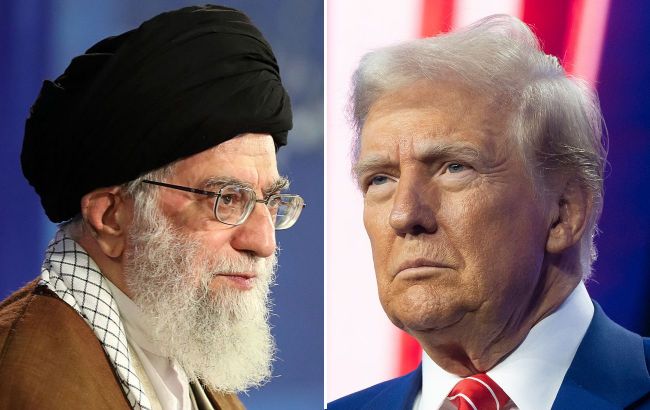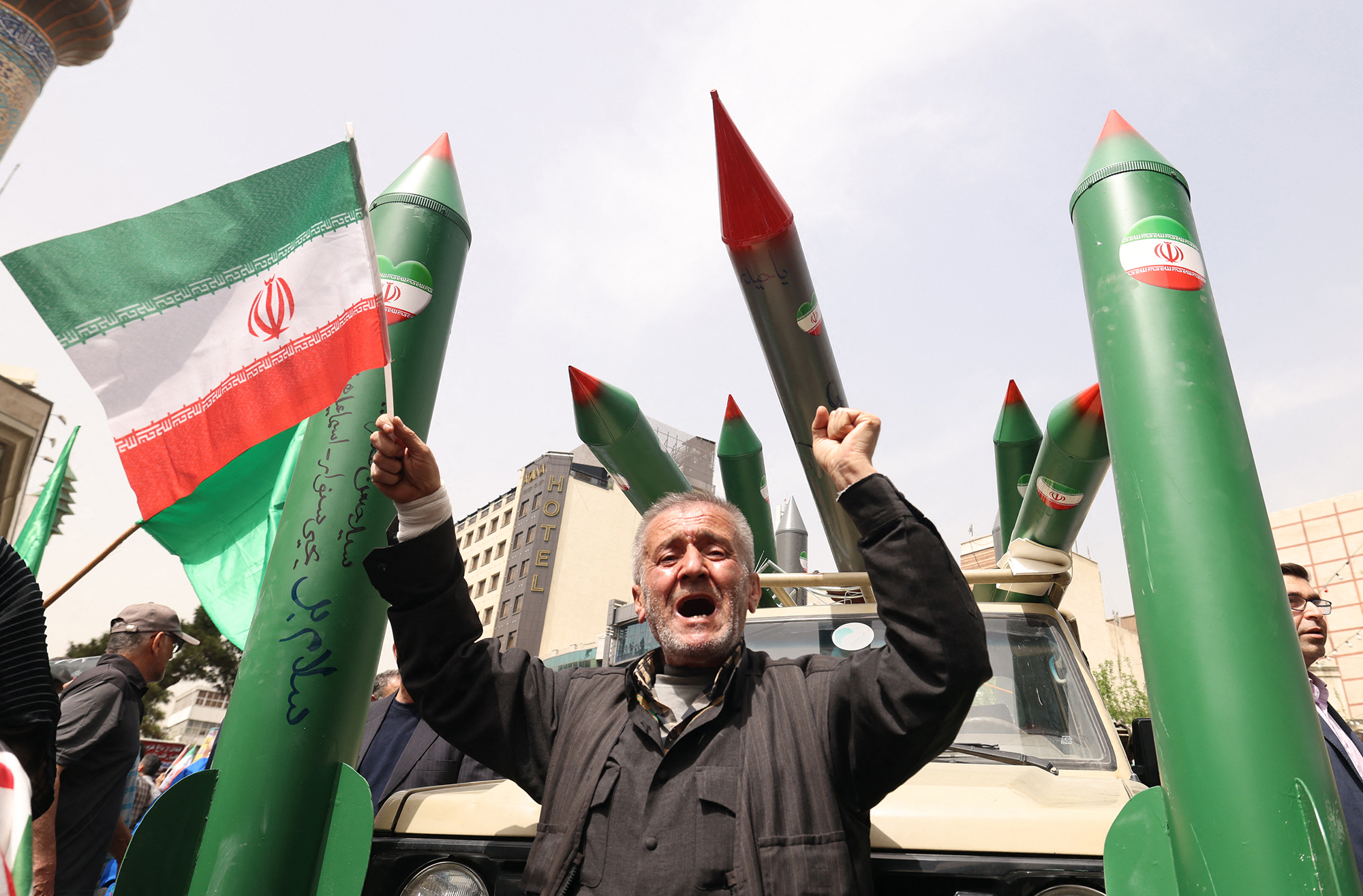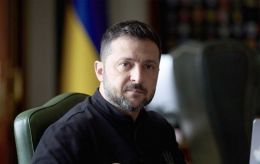US-Iran meeting: Breakthrough or deadlock on nuclear deal?
 US President Donald Trump and Iranian Supreme Leader Ali Khamenei (collage: RBC-Ukraine)
US President Donald Trump and Iranian Supreme Leader Ali Khamenei (collage: RBC-Ukraine)
Today, April 12, negotiations between the US and Iran will take place in Oman regarding Iran's nuclear program. The main concern is the West's fear that Tehran may begin developing nuclear weapons.
RBC-Ukraine explains what to expect from the talks and why they are important for US President Donald Trump.
Key points:
-
How did tensions between the US and Iran over the nuclear program arise?
-
Why is Trump trying to solve problems he himself created during his first term?
-
What will the outcome of the talks depend on, and what are the risks if they fail?
How tensions rose before the negotiations
The Iranian delegation will be led by the country's Foreign Minister, Abbas Araghchi. The US delegation will be headed by the special US envoy to the Middle East, Steve Witkoff. It is planned that the US and Iran will follow a model similar to the one used during consultations between the US, Ukraine, and Russia in Saudi Arabia. This time, however, the US will not only act as a mediator but also as a participant. Direct contacts between the sides are also possible.
The meeting was preceded by a noticeable increase in tension between the two countries. Donald Trump has long been urging Iran to negotiate over its nuclear program. On March 30, he escalated the situation with direct threats.
“If they (the Iranians) don't make a deal, there will be bombing. It will be bombing the likes of which they have never seen before,” Trump said in a phone interview with NBC News.
Following this, the Iranian Armed Forces prepared missiles capable of striking US positions. Meanwhile, Iranian officials have expressed their willingness to negotiate.
At the end of March, Donald Trump sent a letter to Iran’s Supreme Leader Ayatollah Ali Khamenei, proposing to begin talks on a new nuclear agreement, CNN reported, citing a source familiar with the contents of the document. According to the source, the letter was sent via Steve Witkoff to the President of the United Arab Emirates, who then passed it on to the Iranian side. Iran agreed to negotiations.
“It is as much an opportunity as it is a test. The ball is in America’s court,” Iran’s Foreign Minister Abbas Araghchi wrote on social media platform X.
Ahead of the talks, trilateral consultations were also held between Iran, Russia, and China. Expert delegations at this meeting exchanged their views and proposals on the nuclear issue, according to an official Iranian statement.
At the same time, the Nour News portal, known for its close ties to the Iranian government, reported that this meeting is a counterbalance to US pressure.
Just before the meeting in Oman, the US announced new sanctions against Iran’s oil industry.
Why the US is concerned about Iran’s nuclear program
Iran’s nuclear program has raised concerns among world leaders since the early 2000s. At that time, investigators discovered secret nuclear facilities that Tehran had not reported to the International Atomic Energy Agency (IAEA).
Following extensive negotiations in 2015, Iran, along with the five permanent members of the UN Security Council and Germany, signed the Joint Comprehensive Plan of Action (JCPOA), also known as the "nuclear deal." This document involved the easing of economic sanctions on Iran in exchange for scaling down its nuclear program.
However, in 2018, Trump decided to pull the United States out of the agreement and reimpose financial sanctions on Iran. Since then, the IAEA has had only limited access to Iran’s nuclear facilities. Therefore, Trump is now addressing problems he himself created during his first term in office.

A protester waves the national flag of Iran, chanting slogans against Israel and the US during a rally in Tehran on April 9 (photo: Getty Images).
Iran does not currently possess nuclear weapons but is very close to developing them. As RBC-Ukraine has reported, the weakening of deterrence systems and Iran’s influence in the Middle East has pushed a radical faction within the Iranian elite to consider nuclear weapons as the only means of defense against external aggression. There is no confirmation yet that a final decision has been made. However, the IAEA's February report indicates that Iran’s enriched uranium stockpiles have significantly increased. This poses challenges for US interests in the Middle East.
What to expect from the negotiations in Oman
On April 5, Iranian Foreign Minister Abbas Araghchi stated that "direct negotiations would be meaningless with a party that constantly threatens to resort to force in violation of the UN Charter and that expresses contradictory positions from its various officials." At the same time, the Iranian leadership is partially interested in lifting sanctions and easing economic pressure, but they do not trust the US.
In his letter to Iranian leadership, Trump clearly set a two-month deadline for reaching an agreement. This deadline will expire before the next quarterly meeting of the IAEA Board of Governors, where European states are expected to push for the UN observer to publish a "comprehensive report" on Iran's nuclear program.
This step is expected to precede bringing the "Iranian issue" back to the UN Security Council. As Tehran warned earlier, this could lead to its withdrawal from the Non-Proliferation Treaty and free it from all obligations to the international community.
At this point, the US is more interested in the success of the negotiations, which puts them in a somewhat weaker position. It is also possible that Tehran will try to drag out the talks, much like Russia is doing with Ukraine, said Arkady Mil-Man, an Israeli diplomat and head of the Russia Studies Program at the Institute for National Security Studies in Tel Aviv, in an interview with RBC-Ukraine.
"Both of these countries, Russia and Iran, will certainly use this to their advantage. It’s natural, and it's no surprise to us. The real question is how actively the US administration will participate and whether it will lead to any result they are trying to achieve," Mil-Man said.
According to him, Trump verbally expresses readiness for military action against Iran, but whether he will actually take such a step remains uncertain.
"We remember that Trump made various statements and then contradicted them. So, it’s hard to say whether he really intends to use force – or not," the expert added.
The situation is further complicated by the lack of clarity on the negotiating positions, "red lines," and the limits of compromises both sides are willing to make.
Ahead of the talks, Iran’s Foreign Ministry stated that only the nuclear program would be discussed in Oman. However, Trump’s special envoy for the Middle East, Steve Witkoff, said in a March 21 interview with blogger Tucker Carlson that there are other issues important to the US. These include Iran’s support for several groups that pose a threat to US allies, such as Israel and Saudi Arabia. In Israel itself, there are concerns about possible direct contacts between Washington and Tehran, during which the US side may not fully take into account the interests of its Israeli allies.
Sources: CNN, Nour News, Amwaj Media, Politico, and comments from Israeli diplomat and analyst Arkady Mil-Man.

